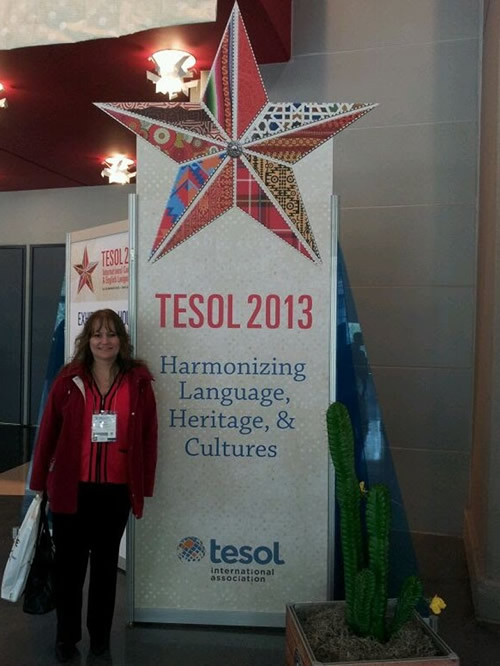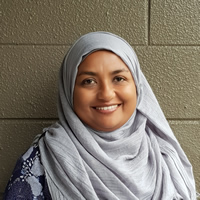TESOL Board Connect: Embracing Your Passion
by Graciela Martin
 From a very young age, I was fascinated with the English
language and was determined to learn it. So, thanks to my parents, by the age
of 7, I was taking private lessons twice a week.
From a very young age, I was fascinated with the English
language and was determined to learn it. So, thanks to my parents, by the age
of 7, I was taking private lessons twice a week.
I recall I would grab any chance I had to speak the
language outside of class, or watch a movie that was not dubbed into Spanish.
In those days, students did not have the availability of resources we all have
nowadays. I still remember the excitement when I watched my first subtitled
film at the movie theater. I was already a teenager then, and I was amazed to
hear Robert Wagner’s real voice in the 1974 movie Towering
Inferno!
I would say that I first fell in love with the
English language, and years later, with teaching.
When I reflect upon why I decided to become a
teacher, I inevitably think of two great teachers I had. They knew how to make
each biology and history lesson memorable. They showed passion for the subjects
they taught, and that was certainly contagious. They became my role
models.
So, nobody was surprised when years later I set out
to become an English teacher. I studied very hard and, soon after I graduated,
I started teaching in a secondary school. I had no doubt: Teaching was my passion, too. I found real pleasure in designing teaching
materials for my classes and thinking about what might be the best way to
introduce a certain vocabulary item, or to practice a given structure. I was
rewarded with students’ engagement and a great sense of fulfillment. I knew I
had made the right choice.

Argentina license plate name keychain attached to my first TESOL Convention bag.
In a few years’ time, my career path as a classroom
teacher would change to include different teacher-leadership roles that I had
never before intended to pursue. When I started teaching at ICANA, the
binational center in Buenos Aires, a totally new professional path unfolded in
front of me. The center had a robust teacher development program, which I was
soon asked to join. I really enjoyed these new roles as teacher-trainer and
materials developer. I also started presenting at seminars as part of the
program. I still have such vivid memories of those times! So many things
learned, so many things shared!
It was through the binational center that I first
heard of ARTESOL,
and through the affiliate that I came to know about TESOL International
Association.
The first TESOL Convention I attended was TESOL’s
40th Annual Convention & Exhibit in Tampa in 2006. The moment I entered
the convention center will always stick in my memory. I couldn’t believe the
size of the premises and the number of attendees. My mind was blown! The theme
of the convention, “Daring to Lead!”, definitely left me thinking. Teachers can
be great leaders.

TESOL 2013 in Dallas, Texas.
That same year, I was invited to volunteer my time
to serve at the local affiliate in Argentina. This was undoubtedly a turning
point in my career. Volunteer service was a whole new experience for me, one
that filled me with joy and accomplishments. I had the chance to learn so much
from the leaders of the affiliate. I was impressed at how much they worked for
the affiliate and also by the great admiration they felt for TESOL
International Association. From that moment on, I have met amazing TESOL
leaders who also share a passion for TESOL International Association, and they
have definitely inspired me to serve.
So here I am today, serving the association. It is
in serving that I have found my other passion, one that gives me a sense of
purpose beyond my regular job. It has become one of the most rewarding
experiences I have had in my professional lifetime so far.
You cannot change who you are—your life story. In
the same way, you cannot change what makes you happy, or what you love. If you
follow and embrace your passion, you will feel that sense of accomplishment and
satisfaction that will fuel you to go for more.
The passion that you put into what you do makes a
difference not only to you, but also to those around you.
I am extremely grateful to have met these
passionate teachers and leaders who have motivated me to become a better
professional and a leader. They have helped me find my purpose in serving
others: my students, other teachers, and TESOL International Association, the
professional home that gathers colleagues who love the TESOL profession, people
who are passionate about English language teaching and learning.
Dare to serve! Dare to lead!
Graciela Martin is the academic coordinator at Instituto Cultural Argentino Norteamericano, the binational center in Buenos Aires. She is a graduate from Instituto Superior del Profesorado Joaquín V. González and holds a degree in education from Universidad Nacional de Quilmes, Argentina. Graciela is a former president of ARTESOL and a current member of the TESOL International Association Board of Directors. Her areas of interest include English as a foreign language, technology in education, materials/curriculum development, and teacher-training.
TESOL Blogs
Interested in writing a blog for TESOL?
Read the submission guidelines and send us your post!
Check out some of the most recent TESOL Blogs:
|
Navigating the Reading Wars With English Learners, by Barbara Gottschalk

If you follow literacy issues, you have probably heard of the Reading Wars. If you haven’t, Jill Barshay’s recent article for the Hechinger Report does the best job I’ve seen yet of explaining the nuts and bolts of this disagreement over how to best teach young children to read. As comprehensive as the story was, however, it failed to mention English learners (ELs). This is disappointing but not unique. ELs often suffer collateral damage in the Reading Wars because both sides overlook their specific needs. Let’s address this issue from an EL’s perspective. Read more. |
|
5 Tips for Supporting New Multilingual Students and Families, by Naashia Mohamed

Over the last fortnight, I spoke with several immigrant families with school-aged children who narrated to me their stories of migration and starting a new life in a different country. As they reflected on their experiences of starting a new school, I realized one common thread that connected them all: their worry that they may not be understood, and that they may not be able to understand others.
Arriving in a new country and attending a school where they are surrounded by and have to learn in a language that is not their own is, of course, extremely difficult for students. But it is also challenging for teachers. As teachers, we want to get to know the students and their families. We want to ensure that students are happy, comfortable, and ready to learn. This is hard to achieve if there is a communication barrier. So, what can we do to support new students, create an environment that empowers them, and help their families to thrive? Here are five recommendations, based on the experiences of the families I spoke with recently. Read more. |
|
4 Poetry Ideas for Young Language Learners, by Hetal Ascher

Language learners can often find writing poetry to be an intimidating task, but with some structure and examples, poetry can be easy and fun to write for language learners of any level. Incorporating poetry into your English lessons is a great way to promote creativity and self-expression.
These are some poetry activities geared toward younger learners. You can do a stand-alone poetry lesson, or you can integrate poetry into a unit on another topic. The last two are designed to be easily integrated into content lessons, so I’ve written some examples for you on science topics. Read more. |